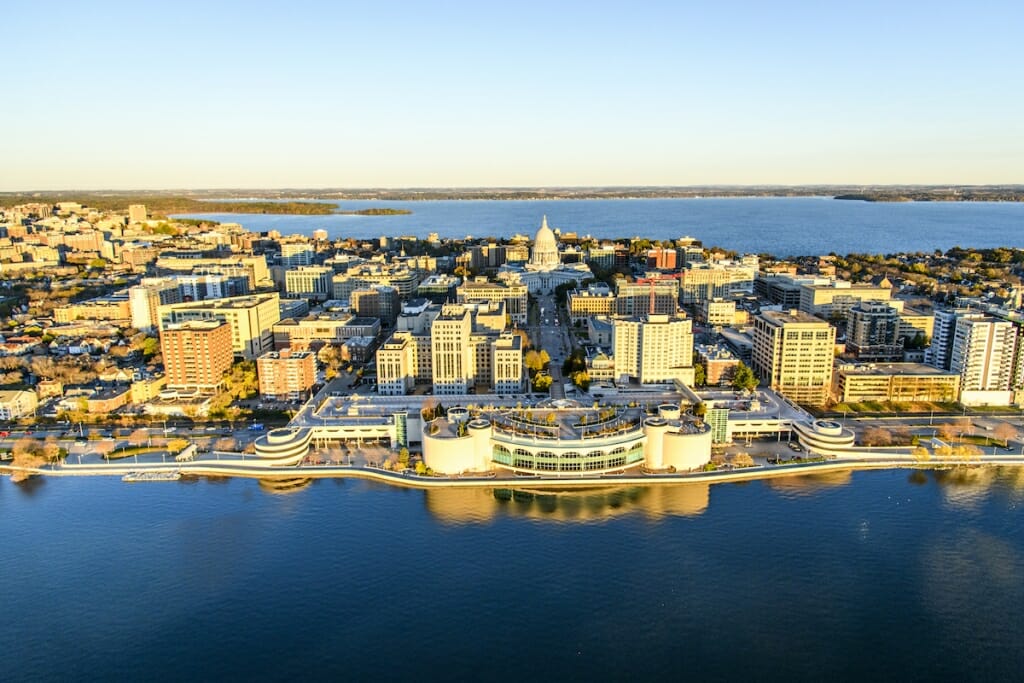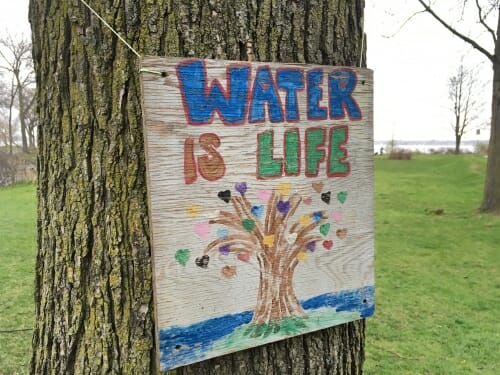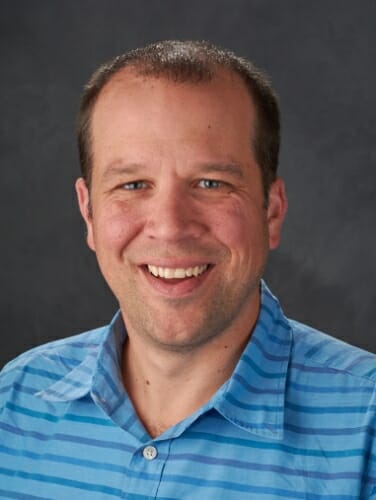Virtual symposium addresses key resource during pandemic: clean water

Lake Monona (foreground) and Lake Mendota, along with the downtown Madison Isthmus and Wisconsin State Capitol. The view is up Martin Luther King Jr. Blvd. from Monona Terrace. Photo: Bryce Richter
It may have made the work look a bit different, but the COVID-19 pandemic just made clean water’s importance that much clearer.
“You can’t wash your hands if you don’t have water,” says Matt Ginder-Vogel, a professor of environmental biogeochemistry within the Department of Civil and Environmental Engineering at the University of Wisconsin–Madison and chair of the cross-campus research collaboration Water@UW–Madison.
And so, the spring 2020 Water@UW–Madison symposium will go on as planned — just virtually. From 9:30 a.m. to 12:30 p.m. on Tuesday, May 5, researchers, legislators and state officials will discuss ways they can collaborate to safeguard clean water across Wisconsin.

A handmade sign along the Yahara River in Madison captures the spirit of the spring 2020 Water@UW–Madison symposium. Eric Hamilton
The importance of access to clean water was recently put into stark relief, says Ginder-Vogel. Most water utilities halted shutoffs or late fees as the coronavirus pandemic spread and people’s finances grew strained just as they were holed up at home relying on their taps.
“Often you only think of water as something you drink, but it’s such an essential part of cleaning and so many aspects of our everyday life. Of all our essential services, water supply and water treatment might be the most critical,” he says.
The theme for the conference, called “Working Together to Address Water Challenges – UW–Madison and State Government,” was inspired by Gov. Tony Evers’ declaration of 2019 as the Year of Clean Drinking Water. The symposium will open with remarks by Chancellor Rebecca Blank and Lt. Gov. Mandela Barnes. Representatives Todd Novak and Katrina Shankland, co-chairs of the Speaker’s Task Force on Water Quality, will also host a detailed Q & A on the group’s work over the last year.
The rest of the conference will focus on a range of threats to clean drinking water and healthy waterways in the state. Many of these threats have made headlines both around the state and across the country. They include nitrate contamination from manure spreading and the presence of long-lasting chemicals known as PFAS from industrial sources in streams and groundwater.
These threats are intertwined, says Ginder-Vogel. As municipalities source deeper groundwater to avoid surface contaminants like PFAS, they risk increasing the amount of radium leaching into the water supply. The interdisciplinary Water@UW–Madison collaboration helps researchers address multiple overlapping problems.
The decision to make the symposium virtual wasn’t an easy one. They’d miss the serendipity and camaraderie only possible from in-person connections.
“We were originally thinking of canceling it outright,” says Ginder-Vogel. “What inspired us to go virtual was the Wisconsin Lakes and Rivers Convention had to switch their whole conference to virtual with about four days’ notice, and it went really well. And we said, ‘If they can do it with four days’ notice, we should be able to do it with a month’s notice.’”
The virtual format does come with some benefits. Rep. Novak can more easily attend now that driving to Madison isn’t necessary. And a graduate student-organized career mentoring panel taking place later in the week was able to source far-flung mentors from different career paths.
“I don’t know if we would be able to get all those people to come to Madison, but they can come for a half hour or hour online,” says Ginder-Vogel.
Water@UW–Madison started six years ago to connect scientists in various departments that were united by their focus on water research. The group has fostered collaborations, advocated for support and funding, and secured new hires and infrastructure. Today it counts about 120 affiliate members among faculty and permanent staff and many more graduate students and postdoctoral researchers.
They’re expecting more than 200 people at the virtual conference on Tuesday, but registration remains open until then.
“We have a great network of researchers on campus and everyone’s expressed a lot of enthusiasm for the meeting,” says Ginder-Vogel. “I’m really happy we get to do it.”
Tags: engineering, environment, state relations, water




